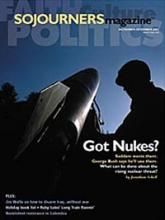On my way to El Salvador last spring, I spent an hour in the Houston airport. I quickly discovered that I wasn't the only Christian headed south that day. Three groups of 20 or 30 marched past, each dressed in matching T-shirts with a Bible verse on the back. One lined up to go to Quito, Ecuador, another to Guatemala City. I didn't stop these missioners to read their T-shirts, but if they shared the philosophy expressed on the countless church Web sites I've visited recently, the verse may well have been Matthew 28:19, often called the Great Commission: "Go therefore and make disciples of all nations."
In practice, however, evangelism usually takes a back seat on trips made by members of both conservative and liberal churches. Most missioners I've talked to, regardless of their fundamentalism or lack of it, can afford to look askance at the white American pastor of Barbara Kingsolver's novel The Poisonwood Bible, who tries to coax terrified Africans into a river full of crocodiles to baptize them. Some may think evangelism should take a front seat when they board their planes, but on most trips other purposes quickly become primary: building schools or delivering medical care, learning, giving back, being transformed. Often the missioners themselves are the converted ones. We learn from the poor of Latin America important lessons on how to live in community, depend on God in a daily and radical way, and preserve hope.
Read the Full Article
